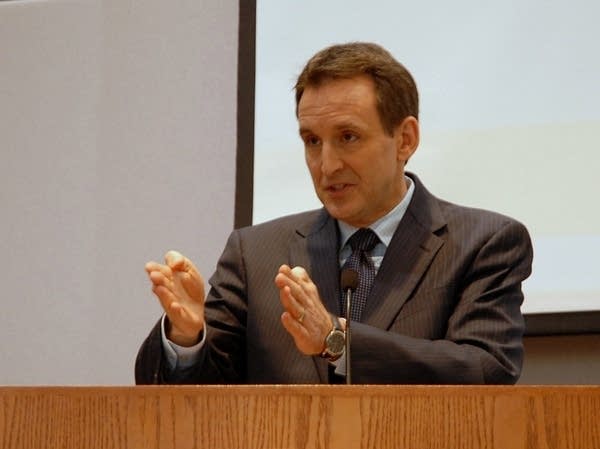Tax debate pits Senate vs. House vs. Pawlenty
Go Deeper.
Create an account or log in to save stories.
Like this?
Thanks for liking this story! We have added it to a list of your favorite stories.

With his proposal to raise income taxes on every Minnesotan, Sen. Tom Bakk, DFL-Cook, said he admits that state income tax cuts in 1999 and 2000 set the state on the wrong path.
"The pendulum swung too far, and we made tax cuts that were not sustainable over the long haul," said Bakk.

Bakk said his plan would restore structural balance in the state's economy. The higher rates he's proposing vary based on income, but a person with an adjusted gross income of $50,000 would see a tax increase of $325 under the bill.
Minnesota's top earners would see the highest increase. Joint filers who earn more than $250,000 a year would pay a new top rate of 9.2 percent under the bill.
Turn Up Your Support
MPR News helps you turn down the noise and build shared understanding. Turn up your support for this public resource and keep trusted journalism accessible to all.
Bakk said the income tax increases would be temporary, and would expire in 2014. He said he proposes increasing the rate for wealthy Minnesotans because studies show they pay a smaller percentage of their income in taxes than lower-income Minnesotans.
Bakk said the highest earners would pay most of the $2.2 billion generated from the bill.
"There are two million income tax filers in the state. About 80,000 of them are going to pay 40 percent of the income tax that's raised in the bill," said Bakk.

Bakk's bill also includes some cuts to state aid to local government, a gas tax credit for lower-income Minnesotans and a property tax refund.
He said his bill would focus on job creation by providing tax credits for startup businesses and high-tech businesses. It would also provide an upfront sales tax exemption for capital equipment purchases.
The plan, however, would end Gov. Pawlenty's signature economic development initiative, JOBZ, by preventing new businesses from signing up for the program.
Although Bakk argues his bill focuses on job creation, Republicans in the Senate disagree.
"The only jobs that this kind of tax bill is going to grow are real estate agents in Florida and Arizona," said Sen. Geoff Michel, R-Edina, who was joined at a news conference by Sens. Dave Senjem of Rochester and Julianne Ortman of Chanhassen.
"The pendulum swung too far, and we made tax cuts [in 1999 and 2000] that were not sustainable over the long haul."
Ortman said Senate DFLers don't seem to understand that the current recession is causing real economic problems for Minnesota families.
"Families and businesses everywhere are looking at all of their assets, all of their funds, all of their savings. They're looking in their mattresses to see what they've got, and they're putting it on the table to pay their bills one month at a time," said Ortman. "This is not the time for the state to try to resolve its long-term structural deficit. We need to deal with the current storm first."
Ortman and other Republicans said they would prefer to adopt Republican Gov. Pawlenty's plan, which doesn't increase taxes but relies heavily on one-time money and an accounting shift to balance the budget.
Senate DFLers argue Pawlenty's plan only delays the budget problem for two years. And they say Pawlenty, too, relies on new revenue to balance the budget -- including a plan to sell half of the annual payments tobacco companies make to the state for an upfront lump sum of $920 million.
Bakk said he hopes the full Senate will vote on the tax bill by the end of the week. That measure will have to be reconciled with a House tax bill that barely made it out of committee today.

"I'll tell you, sometimes you got to walk the plank, don't you?" said Rep. Tom Rukavina, DFL-Virginia today, as he cast the deciding vote to move the bill out of the House Taxes Committee.
The committee approved it on a 16-14 vote. Rukavina said he voted for the bill to get it out of committee, but said he isn't sure if he'll vote for it again.
The House bill would increase income taxes for top earners. It also would raise alcohol and cigarette taxes and eliminate tax exemptions, including the mortgage deduction.
Rukavina unsuccessfully tried to attach a temporary income tax increase to the bill. He said he's unhappy that smokers and drinkers will be taxed more.
"We know who smokes cigarettes. ... It's the poorest of the poor," said Rukavina. "They balanced our budget three years ago with a 75-cent tax, and now they're being asked to do it again in this bill. I just don't think it's right."
The House tax bill now moves to the House Finance Committee. A spokesman for Gov. Pawlenty said Pawlenty will not support any tax increases.




